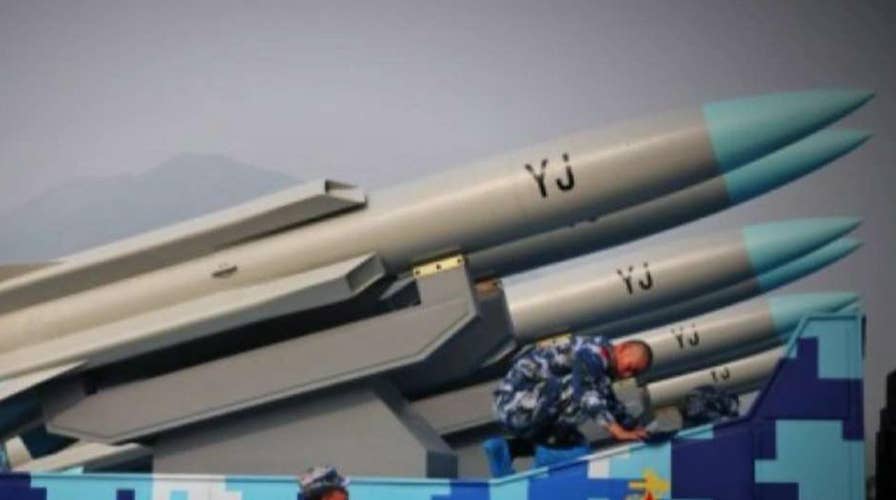US warns China of 'consequences' over militarization
China ramps up activities in the South China Sea as the nuclear situation in North Korea dominates the region's attention; Gillian Turner reports from Washington.
Tariffs aren’t the only issue on the table when it comes to U.S.-China relations. That fact was a major takeaway from our recent trip to China, where we met with some of the country’s top business and political leaders.
The United States has been a consistently dominant economic force in the world for over a century, but China is catching up. It isn’t the country it was as recently as five years ago. With a middle class of over 400 million, China is certainly past its days as a “developing” nation, although it prefers the world doesn’t see it for what it is – the world’s second-largest economic and military power.
America’s outdated view of China could result in lost opportunities, or even worse, dangerous miscalculations or complacency. That needs to change. America’s leaders need to wake up. We must have a long-term plan to compete and deal with China’s rising economic and geopolitical influence.
One of China’s greatest strengths is its ability to plan decades into the future. This is especially apparent in the development of its innovation economy, which is beginning to rival – and in some cases surpass – that of the United States.
China is home to four of the world’s 10 biggest Internet companies measured by market capitalization. Its consumer marketplace is becoming both cash- and card-free, replaced by mobile phones.
When it comes to Internet connectivity, China is beating the U.S. in the race to 5G. With 30 to 40 percent of its students studying engineering – compared to America’s 6 to 7 percent – China is training its next generation with the skills necessary to beat the competition in the 21st century global economy.
China is attempting to leapfrog America in the innovation economy. The threat of it surpassing us as the world’s largest economy is not “if,” but “when.” Economists estimate that it could happen in the next 10 years.
China’s economy is not the only thing that is growing. It is militarizing artificial islands in the South China Sea and constructing military bases at foreign ports. It is building modern warships, satellites, missiles and other weaponry.
In addition, China is actively jamming U.S. military aircraft from these outposts. Despite not being involved in any large-scale military conflicts, China’s military budget has soared and is now only surpassed by that of the United States.
China has no plans to slow its growth or restrain its quest for power and regional dominance. If America wants to maintain its influence in the world and protect its workers, consumers, businesses and values, the U.S. must act now to remain competitive.
This means America must take a page from China’s strategic playbook and start thinking in terms of decades, not the next quarter.
The top priority of our trade relationship, both short- and long-term, should be holding China accountable for its blatant theft of American companies’ intellectual property, unfair trade practices, and lack of accountability within the country for bad actors. Reciprocity is key. If we cannot demand Chinese companies operating in America hand over their technology, neither should China be able to make such a demand.
Fairness is also critical. America cannot accept a 25 percent tariff on our automobile exports to China while China sends its automobile parts over with just a 2.5 percent tariff.
Finally and most importantly, U.S.-China relations must not be a zero-sum game. Long-term stability between our two nations depends on the ability of each to pursue its full potential peacefully. We should seek agreements that produce “win-win” solutions for both countries.
The United States fosters an environment for limitless innovation and encourages creativity, problem-solving and technological developments to flourish. This has been a trademark of American life from its beginning.
When America was founded, China possessed the world’s largest economy. However, our country’s ingenuity, commitment to freedom and the rule of law, and sheer grit have propelled the U.S. to the top of the world’s economic and military ladder.
We must not be complacent. The United States must act now by developing a long-term strategy to deal with China. This is a top priority. Otherwise, America may have to settle for second place.
Senators Daines of Montana, Grassley of Iowa, Perdue of Georgia and Johnson of Wisconsin are all Republicans.

